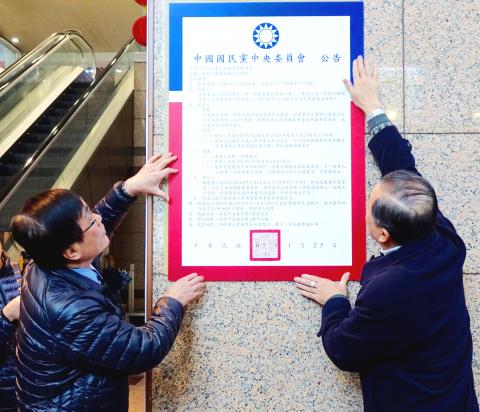Deputy Legislative Speaker Hung Hsiu-chu (洪秀柱) yesterday dismissed speculation that some Chinese Nationalist Party (KMT) legislators might quit the party if she wins the chairmanship by-election.
“Since a party chairperson is elected with the support of a majority of party members, it means that most members agree with that person’s ideas and have decided to let that person take the party helm,” Hung said in Taipei, when asked to comment on the reports.
Hung, who has been branded a champion of rapid unification due to her “one China, same interpretation” proposal, said the only explanation is that people who differ in their ways simply cannot take counsel with each other.

Photo: Chien Jung-feng, Taipei Times
Hung made the remarks after meeting with members of a newly formed alliance called the Structure Defenders” (制度者聯盟).
Established yesterday by scores of KMT representatives and Central Committee members, the alliance has seven aims: holding a debate on the KMT’s future policy direction, revitalizing the KMT’s young forces, establishing a bottom-up policymaking mechanism, cultivating young talent, ensuring transparency of party assets, strengthening ties with people at the grassroots level, as well as lowering thresholds for party chairman election and holding a televised debate and policy presentation among candidates.
Hung said she is willing to participate in a debate on the KMT’s future direction, but it is up to each and every party member to decide to whom they aspire to entrust their party.
As for continued concerns within the KMT about her cross-strait stance, Hung said she is the one to blame because she has failed to elucidate her policies.
“I will surely explain them in the future, but not now,” she said.
KMT Legislator Apollo Chen (陳學聖), who won re-election in the Jan. 16 polls, yesterday threw his hat in the bid for party chairperson, saying his decision was prompted by three reasons.
“First, only a handful of the KMT’s middle-aged members managed to secure victory in the recent elections. As one of them, I cannot sit back and watch while the KMT faces its most difficult time,” Chen said.
The 58-year-old said he also wanted to help the KMT determine the causes of its landslide defeat and create a bottom-up democratic mechanism within the party.
Chen said he had consulted with many peers before making his decision, including former KMT chairman Eric Chu (朱立倫), but declined to reveal whether Vice President Wu Den-yih (吳敦義), who is reportedly interested in vying for the position, was one of them.
Chen is the fifth KMT member to join the by-election, after Hung, former KMT vice chairman Hau Lung-bin (郝龍斌), as well as Taipei City councilors Lee Hsin (李新) and Chung Hsiao-ping (鍾小平).
According to KMT headquarters’ schedules for the by-election, which is planned for March 26, applicants can pick up registration forms for the election today and tomorrow.
They also have to collect signatures from at least 3 percent of all party members between today and Feb. 21 before they can officially register their candidacy on Feb. 22.
See STORIES on page 8

CHAOS: Iranians took to the streets playing celebratory music after reports of Khamenei’s death on Saturday, while mourners also gathered in Tehran yesterday Iranian Supreme Leader Ayatollah Ali Khamenei was killed in a major attack on Iran launched by Israel and the US, throwing the future of the Islamic republic into doubt and raising the risk of regional instability. Iranian state television and the state-run IRNA news agency announced the 86-year-old’s death early yesterday. US President Donald Trump said it gave Iranians their “greatest chance” to “take back” their country. The announcements came after a joint US and Israeli aerial bombardment that targeted Iranian military and governmental sites. Trump said the “heavy and pinpoint bombing” would continue through the week or as long

TRUST: The KMT said it respected the US’ timing and considerations, and hoped it would continue to honor its commitments to helping Taiwan bolster its defenses and deterrence US President Donald Trump is delaying a multibillion-dollar arms sale to Taiwan to ensure his visit to Beijing is successful, a New York Times report said. The weapons sales package has stalled in the US Department of State, the report said, citing US officials it did not identify. The White House has told agencies not to push forward ahead of Trump’s meeting with Chinese President Xi Jinping (習近平), it said. The two last month held a phone call to discuss trade and geopolitical flashpoints ahead of the summit. Xi raised the Taiwan issue and urged the US to handle arms sales to

BIG SPENDERS: Foreign investors bought the most Taiwan equities since 2005, signaling confidence that an AI boom would continue to benefit chipmakers Taiwan Semiconductor Manufacturing Co’s (TSMC, 台積電) market capitalization swelled to US$2 trillion for the first time following a 4.25 percent rally in its American depositary receipts (ADR) overnight, putting the world’s biggest contract chipmaker sixth on the list of the world’s biggest companies by market capitalization, just behind Amazon.com Inc. The site CompaniesMarketcap.com ranked TSMC ahead of Saudi Aramco and Meta Platforms Inc. The Taiwanese company’s ADRs on Tuesday surged to US$385.75 on the New York Stock Exchange, as strong demand for artificial intelligence (AI) applications led to chip supply constraints and boost revenue growth to record-breaking levels. Each TSMC ADR represents

State-run CPC Corp, Taiwan (CPC, 台灣中油) yesterday said that it had confirmed on Saturday night with its liquefied natural gas (LNG) and crude oil suppliers that shipments are proceeding as scheduled and that domestic supplies remain unaffected. The CPC yesterday announced the gasoline and diesel prices will rise by NT$0.2 and NT$0.4 per liter, respectively, starting Monday, citing Middle East tensions and blizzards in the eastern United States. CPC also iterated it has been reducing the proportion of crude oil imports from the Middle East and diversifying its supply sources in the past few years in response to geopolitical risks, expanding